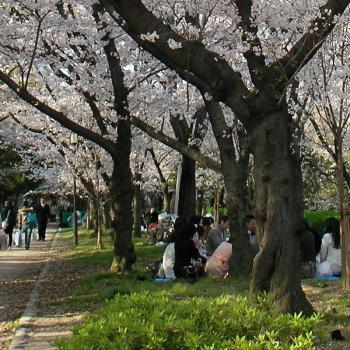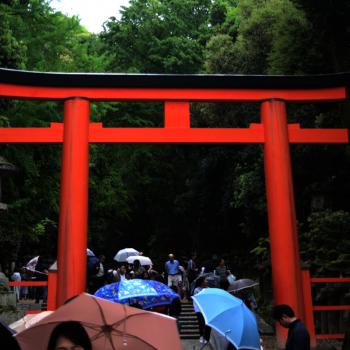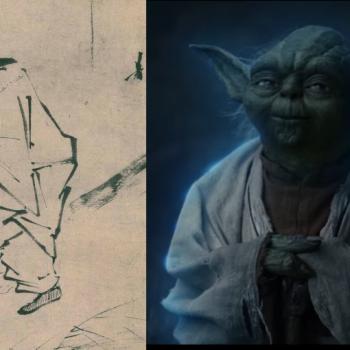An old friend with whom I started my karate training many years ago recently pinged me on Facebook to ask about the actual definition of Zen.
The term is often misused in amusing or bemusing ways in marketing in the West; incidences of this have come to be known as “Dharma Burgers”. My recently discovered favorite is — I kid you not — the “Zen” toilet from Canadian plumbing fixtures company Produits Neptune. (The fact that this Zen toilet is made by a company named after a Greek deity may make this the ultimate Zen Pagan Dharma Burger!)
With usages like that out there, some definition may indeed be in order.

The simple answer is that “Zen” is how the Japanese pronounced the Chinese word “Ch’an”, which was short for “Ch’anna”, which in turn was how the Chinese pronounced the Sanskrit “dhyana”, which means “meditation”. So to a first approximation “Zen” just means “meditation”. If someone talks about their Zen practice, they’re talking about their meditation practice. “Zazen” means sitting meditation. A Zen teacher is a meditation teacher. If you’re going on a Zen retreat, the distinguishing feature is going to be meditation.
(Sometimes it is necessary to distinguish between Zen and Ch’an and its manifestation in other counties, Korean Seon or Vietnamese Thien; but usually when I speak of Zen I mean that whole branch of the Buddhist family tree.)
Now, there are many different sorts and styles of meditation. While there is some commonality of quiet concentration, if you go to a zendo what you will be taught there is very different than the Spiritual Exercises of Ignatius of Loyola or the guided meditations you might find in Pagan ritual. So “Zen” also refers to a sort of meditation distinct from both non-Buddhist types and from that used in other Buddhist schools.
Indeed, we might say that “Zen” refers to two different forms of meditation: the koan practice of the Rinzai style, where a student wrestles with a some bizarre question or statement until their rational mind gives up; and the shikantaza, “just sitting”, practice of the Soto style. To some extent this dichotomy reflects a very old argument in Zen between the “sudden enlightenment” and the “gradual cultivation” doctrines. On the other hand we can focus on the commonality that both are a means to produce an experience of direct insight into reality, beyond rational concepts such as “self”, and see them as two ends of a continuum between rooting in the slowly-changing physiological (the breath and the posture) and in the quickly-changing verbal.
Zen Buddhism is the school of Buddhism in which meditation is the central practice. But Zen Buddhism is distinguished from other Buddhist schools not only by its mediation style, but by its philosophy. It has something of a disdain for authority, for scripture, and for dogma, instead prizing individual direct experience and insight into reality; “a direct transmission outside the scriptures”. So another meaning of “Zen” refers to this philosophy.
At least, in theory Zen has this anti-authoritarianism. In practice, when done badly Zen can end up as hierarchical and authoritarian as anything else. (Particularly Japanese Zen.) Even at its wildest, Zen Buddhism still has its teachers and students, its temples and paperwork. So another meaning for the word “Zen” refers to the institutions of Zen Buddhism. That is, not just the teachings and the practice methods, but the lineage of teachers (supposedly traceable back through Bodhidharma, the semi-mythical founder of Ch’an, to the Buddha himself), the organizations of temples, institutional practices like issuing certificates of enlightenment, the internal politics that goes along with all that, and so on.
(I should note that while I teach meditation as part of my martial arts practice and am authorized within my school to do so, I have zero credentials in formal Zen Buddhism. My own Zen, such as it is, is outsider Zen and makes little reference to this institutional sense of the word; I am in no way an authorized spokesperson for the brand.)
It’s a historical coincidence that Zen got its start in Japan around the same time that the Kamakura Shogunate came to power. The new sect was able to get a foothold with the new ruling warrior class, who found its methods a useful way to prepare the mind for life-and-death combat with three-foot-long razor blades. So Zen, while never the most popular form of Buddhism in Japan, became the Buddhism of the warrior class and came to have an outsize influence on Japanese culture and aesthetics.
And so we have yet another, even more broad use of the word “Zen” to refer to that aesthetic. A Zen temple has a very different design and atmosphere than a Shingon temple, and one doesn’t need to know anything about the teachings of these sects to immediately see and respond to that. And due to institutional Zen’s political influence one can also see that aesthetic in things far removed from the practices or institutions of Zen Buddhism. Someone practicing the Japanese tea ceremony or calligraphy or the martial arts may have never meditated and have no idea about the teachings of Zen Buddhism, yet some of its ideas and values have escaped the temples to infiltrate the nation’s training halls and crafter’s workshops, and from there diffused into the wider world.
So from that perspective, maybe if we can speak of the style of a teacup as being more or less “Zen”, perhaps we could speak of the design of a toilet as “Zen”.
But Produits Neptune’s Zen toilet doesn’t seem to embody the aesthetic of Zen any more than their Delight or Malaga models. It’s pure marketing bullshit. A teacup may be said to be Zen, in this aesthetic sense, but that’s not likely to be true of a mass-produced teacup from the dollar store.
And yet…the Zen philosophy might remind us that all things — all things — partake in the Buddha nature. It might remind us that “To set up what you like against what you dislike is the disease of the mind”, as the Third Patriarch put it.
Maybe, just maybe, we might find that mass produced teacup or that toilet to be every bit as Zen as everything else!
You can keep up with “The Zen Pagan” by subscribing via RSS or e-mail.
For more about the historical origins of Zen, pick up a copy of my book Why Buddha Touched the Earth.
If you do Facebook, you might choose to join a group on “Zen Paganism” I’ve set up there. And don’t forget to “like” Patheos Pagan and/or The Zen Pagan over there, too.

















